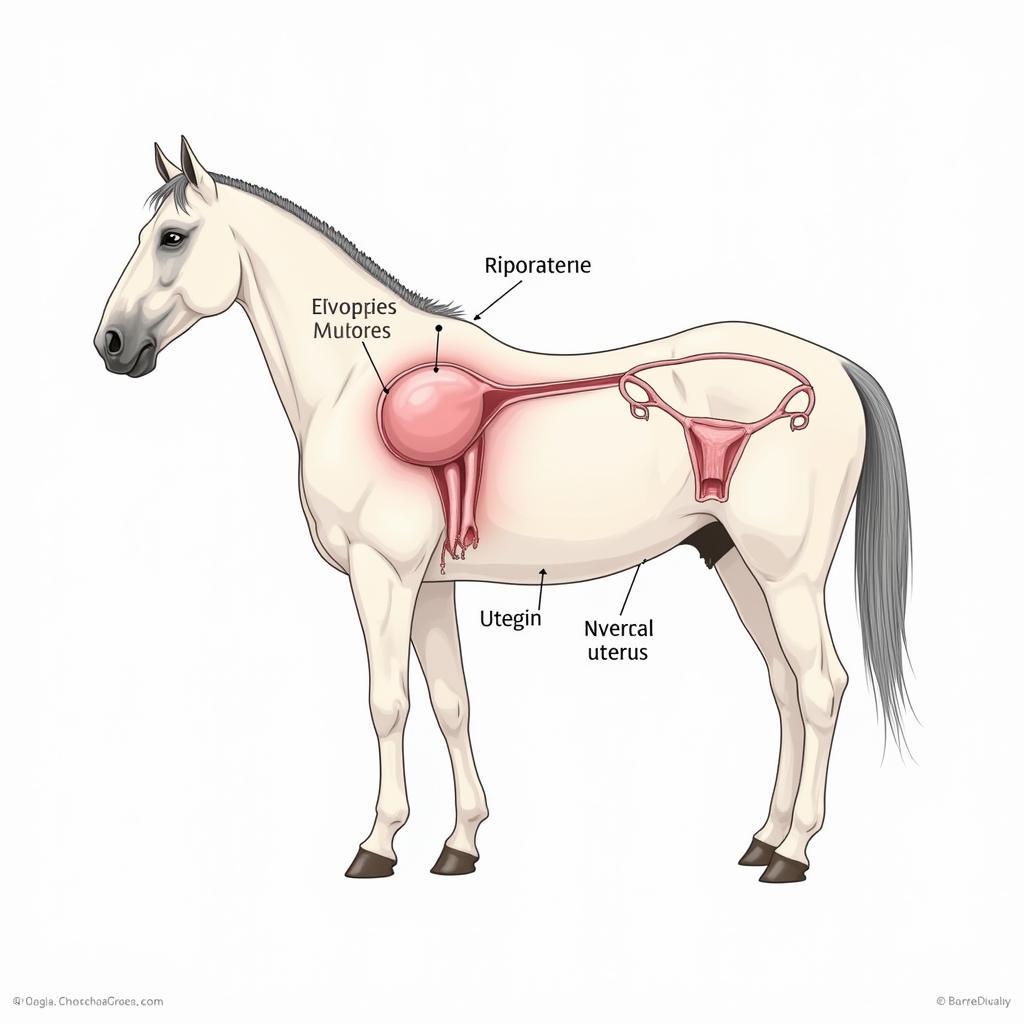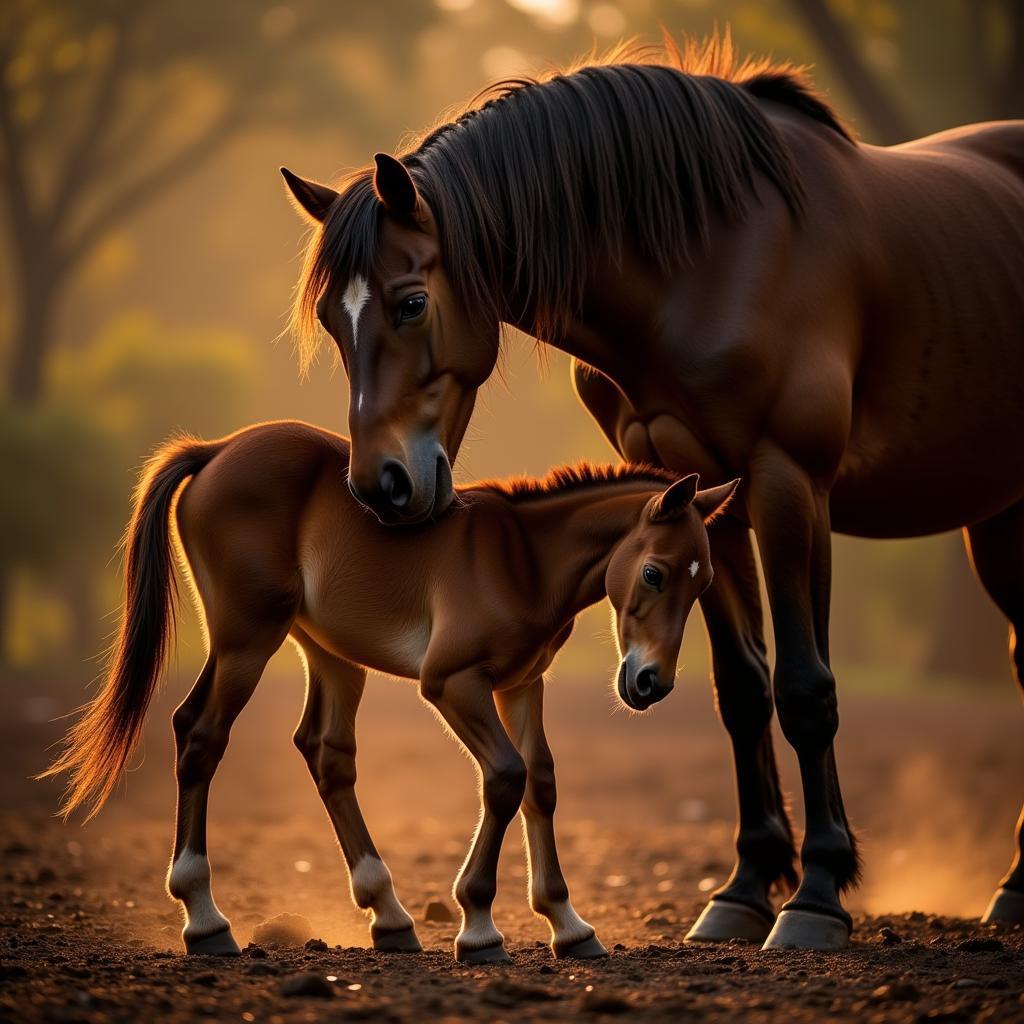The age-old question: do horses lay eggs? You might be surprised to learn that horses, like all mammals, do not lay eggs. This common misconception likely stems from a lack of understanding about basic animal biology. This article will delve into the reproductive reality of horses, exploring why they don’t lay eggs and how they actually reproduce.
Understanding Mammalian Reproduction and Why Horses Don’t Lay Eggs
Horses are mammals, characterized by several key features including giving birth to live young and nursing them with milk produced by mammary glands. Egg-laying is a characteristic of reptiles, birds, and fish. These animals are oviparous, meaning their offspring develop outside the mother’s body within a protective shell. Mammals, on the other hand, are viviparous, meaning their offspring develop inside the mother’s body, receiving nourishment directly through the placenta. This fundamental difference in reproductive strategies explains why horses don’t lay eggs. They simply aren’t biologically equipped for it.
The Biology Behind Horse Reproduction
Horses have a complex reproductive system designed for internal fertilization and gestation. The mare’s estrous cycle regulates her fertility, and breeding typically occurs during “heat” or estrus. Following successful mating, the fertilized egg develops into a fetus within the mare’s uterus, receiving nutrients and oxygen via the placenta. The gestation period for horses is approximately 11 months, after which the mare gives birth to a live foal. This intricate process, shared by all mammals, demonstrates the stark contrast between mammalian and oviparous reproduction.
 Diagram of the equine reproductive system.
Diagram of the equine reproductive system.
Do you remember learning about horse scabies? Skin conditions can affect horses of all ages and breeds. Understanding how to care for your horse’s health is crucial for their wellbeing. Similarly, understanding their reproductive system is also essential knowledge for any horse owner.
Debunking the Myth of Horse Eggs
The idea of Horse Eggs likely stems from confusion or misinformation, perhaps mixed up with other animal species. It’s crucial to rely on accurate information when learning about animal biology. The persistent myth of horse eggs highlights the importance of scientific education and understanding the diverse ways animals reproduce.
Common Misconceptions and Their Origins
Sometimes, children or those unfamiliar with animal biology might imagine horses laying eggs. It’s important to correct this misinformation and explain the distinct differences between mammals and egg-laying animals.
“It’s surprising how often I encounter this misconception,” says Dr. Emily Carter, DVM, an equine reproductive specialist. “Educating people about the basics of animal biology is essential for responsible animal care.”
 A mare giving birth to a foal.
A mare giving birth to a foal.
Effective flea control for horses is essential, just like having accurate information about their reproductive biology.
Conclusion: Horses Don’t Lay Eggs – They Give Birth to Live Foals
In conclusion, the notion of horse eggs is a myth. Horses, as mammals, give birth to live young, a fundamental characteristic that sets them apart from egg-laying animals. Understanding the basics of animal reproduction is vital for proper horse care and dispelling common misconceptions. So, the next time you hear someone ask about horse eggs, you’ll be equipped to set the record straight.
Do you have any questions about your horse’s diet? Maybe you’re interested in the best feed thru fly control for horses? Proper nutrition plays a vital role in their overall health and reproductive capabilities.
FAQ
- Do any mammals lay eggs? No, all mammals give birth to live young.
- How long is a horse’s pregnancy? Around 11 months.
- What is the difference between oviparous and viviparous animals? Oviparous animals lay eggs, while viviparous animals give birth to live young.
- What are some examples of egg-laying animals? Birds, reptiles, and fish are examples of egg-laying animals.
- Why is it important to understand that horses don’t lay eggs? Understanding basic animal biology is crucial for responsible animal care and helps dispel common misconceptions.
- Where can I find more information about horse reproduction? You can find more information from reputable sources like veterinary websites and educational platforms.
- What is the name for a baby horse? A foal.
Perhaps you’ve been wondering about a horse and jockey food menu or are curious about the topic of man eats horse pussy. We encourage responsible and ethical interactions with all animals.
Need further assistance? Please contact us at Phone Number: 0772127271, Email: [email protected] Or visit us at: QGM2+WX2, Vị Trung, Vị Thuỷ, Hậu Giang, Việt Nam. We have a 24/7 customer support team.